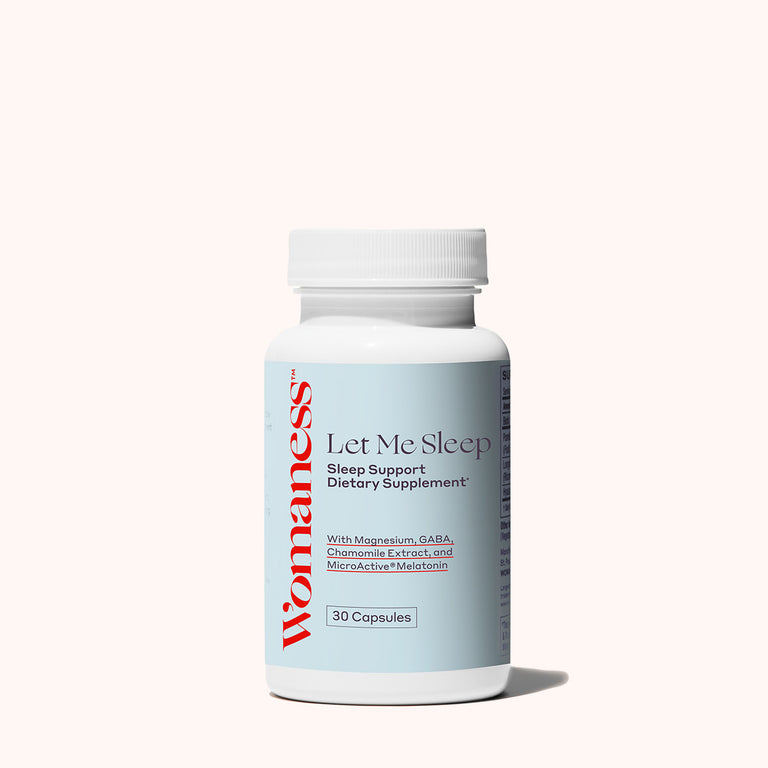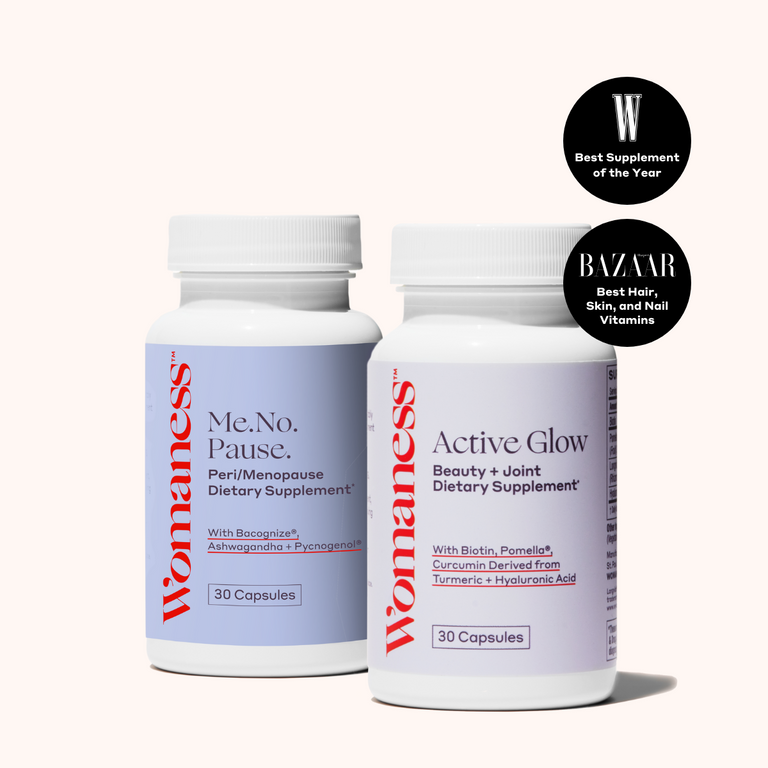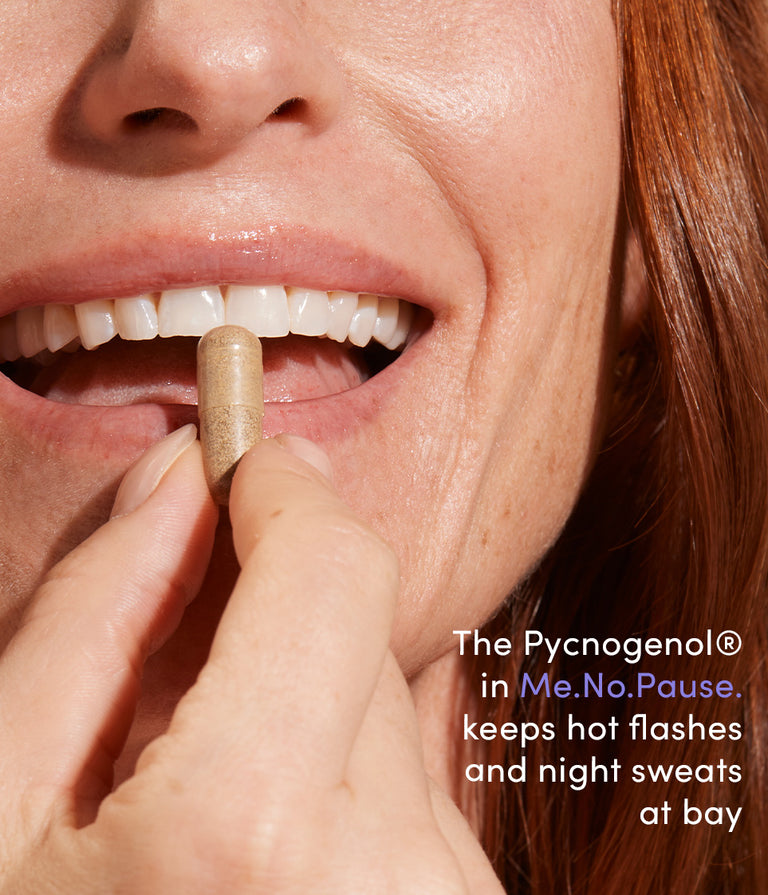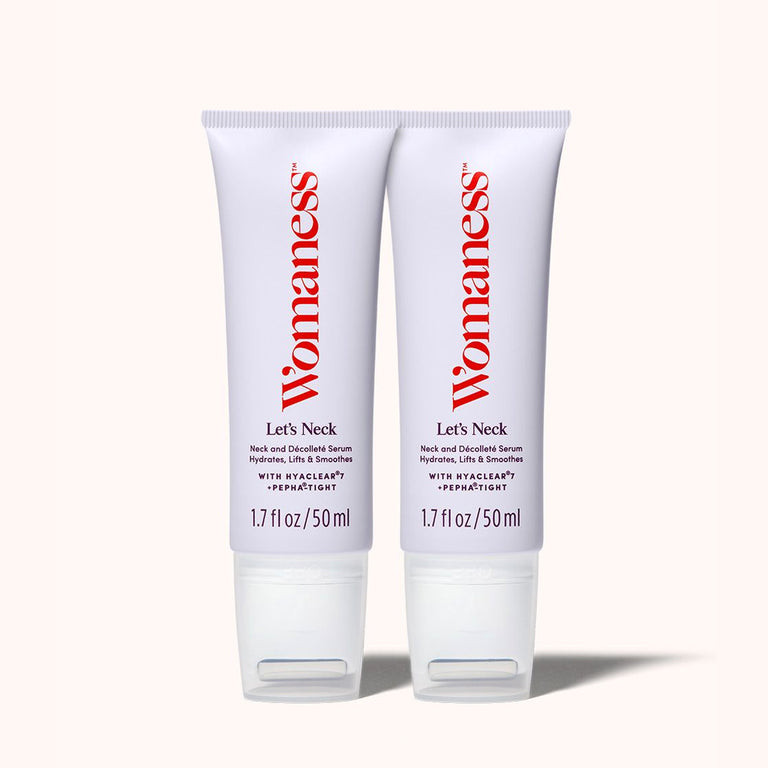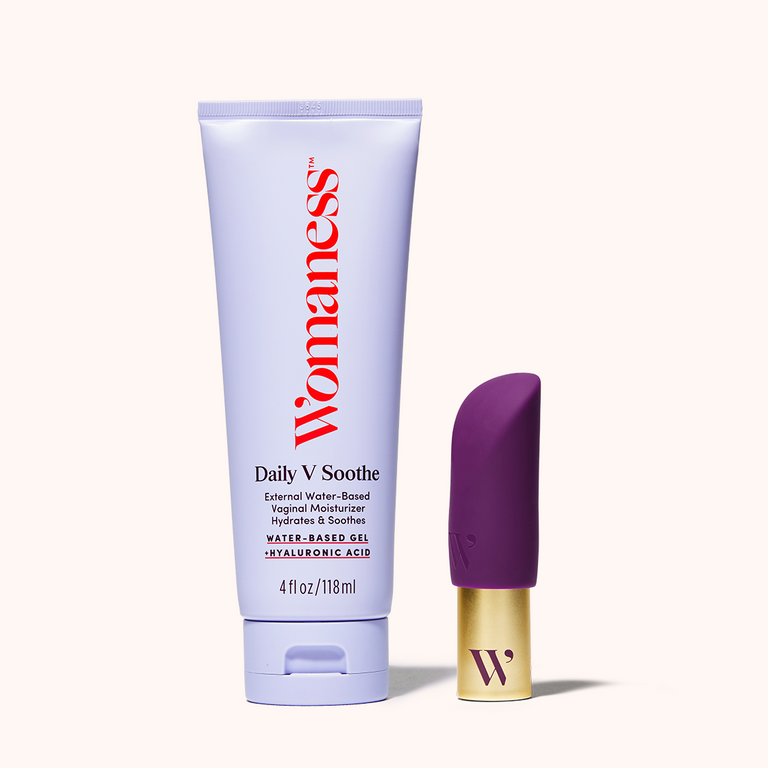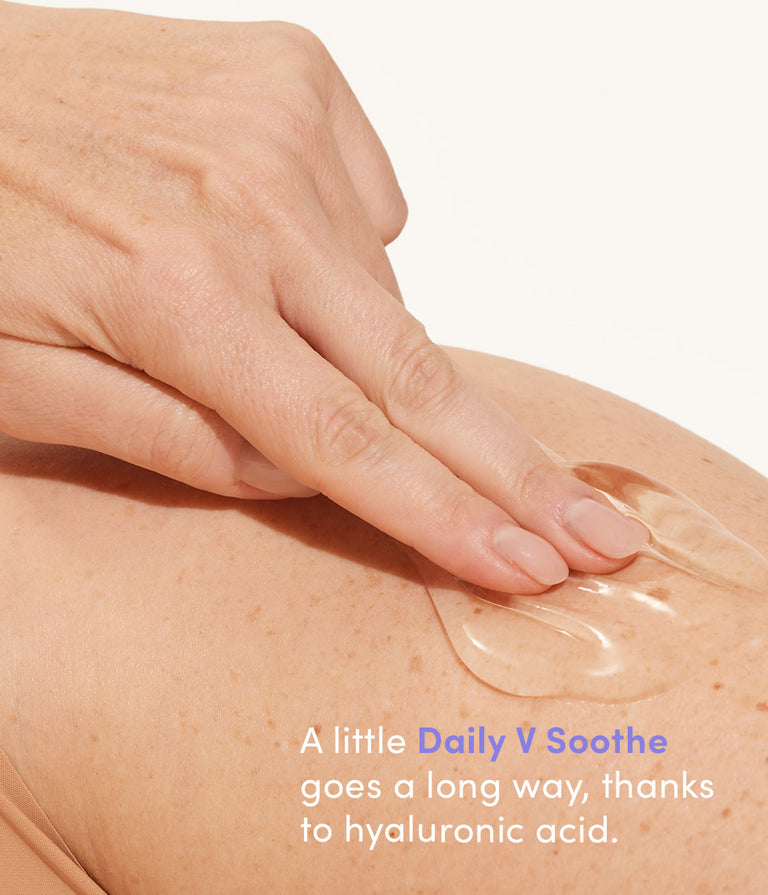By Allie Lansman, RDN, LD 5-Minute Read
 Allie Lansman, RDN, LD is a freelance nutrition and sustainability writer, educator, and consultant. As a dietitian, she is passionate about equipping current and former menstruators to make empowering nutrition choices throughout their lives through inclusive articles—with an eco-consciousness flair!
Allie Lansman, RDN, LD is a freelance nutrition and sustainability writer, educator, and consultant. As a dietitian, she is passionate about equipping current and former menstruators to make empowering nutrition choices throughout their lives through inclusive articles—with an eco-consciousness flair!
You’re likely familiar with menopause’s most annoying symptoms: hot flashes, poor sleep quality, increased fatigue, dry skin, and so on. And, while finding relief might seem impossible, it could be as easy as making simple switches to your daily diet! Learn how to reduce your discomfort with this list of foods to eat—and avoid—for the most common menopause symptoms.
How Does What You Eat Impact Menopause Symptoms?
What you eat can have more impact on your menopause symptoms than you may think. Transitioning into menopause causes your hormones to become unbalanced. The imbalance of the hormone estrogen is fundamental during this time as it supports various essential body functions. The significant drop in these hormones after 50 is the leading cause of the most annoying menopause symptoms.
A diet loaded with nutrient-dense foods—containing a diverse array of macronutrients, vitamins, minerals, and beneficial plant compounds like phytoestrogens—can be your key to promoting hormonal balance and minimizing the uncomfortable side effects of the menopause shift. And, just like being intentional about what foods you’re eating during menopause, you’ll also want to be aware of the foods you should avoid that cause your symptoms to worsen.
What to Eat (and Avoid) for…
While a nutritious diet is excellent for relieving menopause symptoms, certain foods can provide an additional benefit for specific symptoms—mainly their nutrient content.
This list will make it easy for you to determine what food you can add and remove to improve the menopause symptoms you’re experiencing.
Hot Flashes
Estrogen is essential for regulating your body temperature. When these hormones drop during menopause, so does your body’s ability to control your internal temperature and respond correctly to the surrounding environment, resulting in hot flashes and night sweats.
Foods to eat
Healthy fats, like omega-3 fatty acids, can help support temperature regulation as a source of lignans, a compound with an estrogen effect. Find healthy fats in these foods:
-
Fatty fish (i.e., sardines and salmon)
-
Fatty seeds (i.e., flax and chia)
-
Avocado
Foods to avoid
Spicy foods can increase hot flash frequency due to their ability to dilate blood vessels and trigger sweating. A reaction to spicy foods is individual, but these foods may trigger hot flashes:
-
Hot peppers
-
Wasabi
-
Horseradish
Poor Sleep Quality
Hormonal imbalances during menopause also limit the body’s ability to produce serotonin, a hormone vital for regulating your sleep-wake cycle. Not having control of this cycle reduces your sleep quality.
Foods to eat
To get to sleep faster and stay asleep longer, focus on foods that contain tryptophan and melatonin. You’ll find these compounds in:
-
Tart cherry
-
Turkey
-
Mushrooms
Foods to avoid
Caffeine may not be directly linked to worsening your menopause symptoms, but it directly impacts your sleep quality. Limit your intake of these caffeine-rich foods (especially before bedtime):
-
Coffee
-
Caffeinated tea
-
Soda
Weakened Bones
Weakened bones—formally known as osteoporosis—is a common side effect of aging, but it also has a significant connection to menopause. A drop in estrogen immensely speeds the breakdown of bone by stimulating the removal of calcium stored in your bones.
Foods to eat
To support strong bones after 50, you’ll want to focus on eating calcium and vitamin D-rich dense foods to improve bone fortification, like:
-
Milk
-
Dark leafy greens
-
Calcium and vitamin D-fortified drinks
Foods to avoid
Avoid high-sodium foods as excess sodium causes the body to expel calcium in the urine rather than absorb it in bones. These include:
-
Cured meats
-
Saline-injected chicken
-
Chips
Dry Skin
Roughly 30% of the collagen content in your skin is lost in your first five years of menopause. Estrogen stimulates collagen production, and as it diminishes, so does the protein that provides structure, thickness, and moisture retention to the skin.
Foods to eat
Boost collagen production by eating more vitamin C—a component of collagen—producing enzymes. Try adding these high-vitamin C foods to your diet:
-
Citrus fruits
-
White potatoes
-
Bell peppers
Foods to avoid
If you’re experiencing dehydrated skin in menopause, moderate your alcohol intake in addition to improving your skincare routine. Alcohol is a diuretic, which increases your need to expel water and results in drier body tissues—including the skin.
Brittle Hair & Nails
Keratin is a primary component of your hair and nails. And, like collagen, it is a protein in the body that decreases along with estrogen. As the main structural component of your hair and nails, keratin loss results in increased brittleness and breakage.
Foods to eat
Vitamin A promotes keratin synthesis in the body and can promote stronger and more resilient hair and nails. Find vitamin A in foods such as:
-
Pumpkin
-
Cantaloupe
-
Mango
Foods to avoid
Overeating high-mercury fish, typically saltwater fish species, has been linked to an increased risk of brittle nails and hair loss due to blocking keratin production. Check your diet to see if you’re eating these fish a bit too frequently:
-
Tuna
-
Swordfish
-
Mackerel
Brain Fog
Estrogen has been linked to normal cognitive functioning in the brain, especially in the hippocampus and prefrontal cortex regions. Without adequate estrogen, it’s common to experience confusion, slower movement and verbal response, and forgetfulness.
Foods to eat
To combat the side effects of brain fog, ensure your brain has plenty of energy to utilize throughout the day. The brain’s primary source of energy is carbohydrates, so you’ll benefit from adding more of these complex carbohydrates to your diet:
-
Beans
-
Lentils
-
Whole wheat bread and pasta
Foods to avoid
Artificial, zero-calorie sweeteners—aspartame in particular—have been linked to poor cognitive functioning and worsening brain fog by disrupting neurotransmitter production. Avoid these sweeteners that are often found in:
-
"Diet" drinks
-
Sugar-free candies
-
Protein powders
Vaginal Irritation
Estrogen helps maintain the mucosal lining of the vagina, keeping it hydrated and moisturized. Due to reduced estrogen, vaginal atrophy—a thinning, drying, and potential inflammation of the vaginal walls—is stimulated during menopause.
Foods to eat
Probiotic foods can help support the vaginal microbiome—the group of microbes that live in the vaginal tract—to improve overall vaginal health and reduce irritation by fortifying bacterial colonies. Add foods high in the Lactobacillus spp. bacterium, such as:
-
Yogurt
-
Kimchi
-
Sourdough bread
Foods to avoid
Eating too many refined sugars is shown to alter the makeup of the vaginal microbiome, decreasing beneficial bacteria and increasing harmful bacteria. This microbial shift can contribute to an increased risk of vaginal infection and irritation. Reduce how often you eat refined sugar foods like:
-
Baked goods
-
Pastries
-
Canned tomato sauce
Weight Changes
Unexpected changes in weight and shifts in fat storage are among the most common (and annoying!) menopause symptoms. A hormone derived from estrogen called estradiol is responsible for regulating metabolism and weight stability decrease during menopause.
Foods to eat
Eat plenty of nutrient-dense and filling foods to avoid constant weight changes during menopause. They will also support maintaining overall good health.
-
Lean protein
-
Cruciferous vegetables
-
Soybeans
Foods to avoid
Avoid non-filling foods to promote a stable weight. If you’re more focused on calorie counting than satiety, it will have the opposite effect on your weight by increasing your hunger and random snacking.
Eat Your Way to More Comfort During Menopause
Now that you have the tools to make food choices to improve your menopause symptoms, you can add them to your daily routine. However, it’s important to start slowly swapping foods and avoid eliminating your favorite foods, even if they may not be the best for your menopause symptoms. Research shows you’re less likely to keep to new habits when lifestyle changes are overwhelming and unenjoyable. Remember: simple shifts and finding joy in the foods can make the greatest difference!
More For You
7 Changes to Make to Lose Weight in Menopause
6 Foods to Help You Beat Perimenopause Bloating
The Ins & Outs of Intermittent Fasting in Menopause

